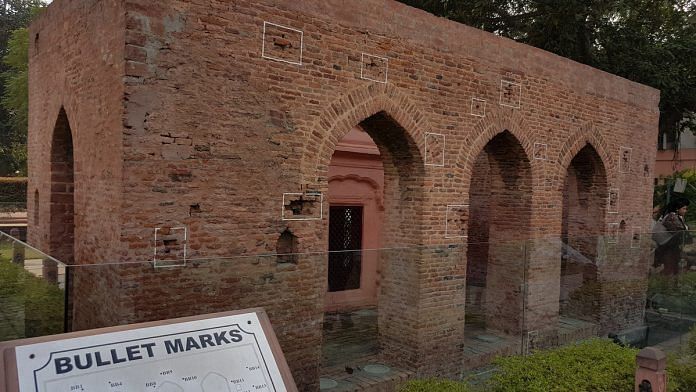New Delhi: On 13 April 2019, the 100th anniversary of the Jallianwala Bagh massacre in Amritsar will be observed. But on the occasion, the British government will not be issuing an official apology, as speculated. Instead, it will issue an “expression of regret” for carrying out the heinous act that killed more than 1,500 people and injured thousands of others, diplomatic sources have told ThePrint.
Although there was widespread expectation among many in India that the British government may finally say “sorry” for what they did, it seems they will issue nothing more than a condemnation, official sources told ThePrint.
Expectations of an official state apology surged when UK Member of Parliament Bob Blackman initiated a debate in the House of Commons, which is scheduled to take place Tuesday. Prime Minister Theresa May is expected to issue a statement Wednesday.
A similar debate had taken place in February in the House of Lords, when the government had hinted that it may issue a full apology.
“The UK government rightly condemned the incident at the time, and consistently to this day, we have made clear that we deeply regret what happened. One hundred years on, we continue to believe that these tragic events should not be forgotten,” said a spokesperson for the British High Commission.
“It is right that we continue to pay respect to those who lost their lives whilst acknowledging that today, the UK and India enjoy a flourishing partnership.”
What happened that day
British Brigadier-General Reginald Dyer, who had taken command over the troops on 12 April 1919, issued an order banning all public gatherings. The following day, when more than 20,000 people gathered in Jallianwala Bagh on the occasion of Baisakhi, Dyer ordered his soldiers to open fire.
Jallianwala Bagh was a walled enclosure with just one narrow entry/exit. As a result, unofficial estimates say more than 1,500 people were killed, though the official figure was 379.
The unprecedented tragedy led Rabindranath Tagore to renounce his knighthood while Mahatma Gandhi returned the Kaisar-i-Hind medal he had received for his work during the Second Boer War.
Also read: The BJP can’t remove Congress from India’s history or from the Jallianwala Bagh trust
Previous expectations came to nought
This is not the first time that India has expected an apology from the British for the attack ordered by General Reginald Dyer on a peaceful gathering.
In 1997, when Queen Elizabeth visited India, there were expectations that she would apologise, because that would have meant an apology by the British crown. However, on a visit to the Jallianwala Bagh memorial, she had said: “History cannot be rewritten, however much we might sometimes wish otherwise. It has its moments of sadness, as well as gladness. We must learn from the sadness and build on the gladness.”
Former Prime Minister David Cameron had also visited the memorial in 2013, calling it a “shameful event”. But he too refused to apologise, stating: “In my view, we are dealing with something here that happened a good 40 years before I was even born, and which Winston Churchill described as ‘monstrous’ at the time and the British government rightly condemned at the time.”
‘Serves no purpose’
Mahesh Behal, a businessman from Amritsar whose grandfather Lala Harilal Behal was killed at Jallianwala Bagh, compared the massacre to the February Pulwama terror attack.
“If the world can cry for Pulwama that killed 40 Indians, why don’t hearts bleed for the Jallianwala Bagh martyrs?” said Behal, 73.
Harish Sharma, a former head of department of history at Guru Nanak Dev University, believes it is too little, too late for the British to apologise for their act.
“These apologies can only appease the politicians. The massacre happened, people were killed in broad daylight, and families have been destroyed. What will an apology do now?” Sharma said.
Also read: UK’s House of Lords is considering an apology for Jallianwala Bagh massacre




Mr N Nagarajan,
This hatred and contempt for fellow Indians facilitated the British rule. And an apology for what? If he is guilty for the deaths of people in godhra riots, he should be duly punished. And if not, then any apology would be just hollow words of no substance.
You misunderstood his comment. He meant Congress leadership for 1984. Surely, he didn’t mean the descendants of Aurangzeb because that dynasty is wiped out. 😀😀
Whether the British establishment says sorry or not, one fact that cannot be denied is that this nation doesn’t put a lid on free speech, and treats historiography as serious business. This is the reason why book shelves in public libraries have books such as “The Butcher of Amritsar: Brigadier-General Reginald Dyer” by Nigel Collette, and “India Conquered” a recent scathing critique of British Raj by Dr Jon Wilson (King’s College).
Our own leader has failed to apologise killing our own people, how can we expect by present day British leaders.
The national flag is flown in our residential compound for one week in April, in memory of those who perished. A very grim milestone in India’s march to freedom. A formal apology is merited, not just for this massacre but for the entire criminal enterprise of two hundred years of British colonial rule in India.